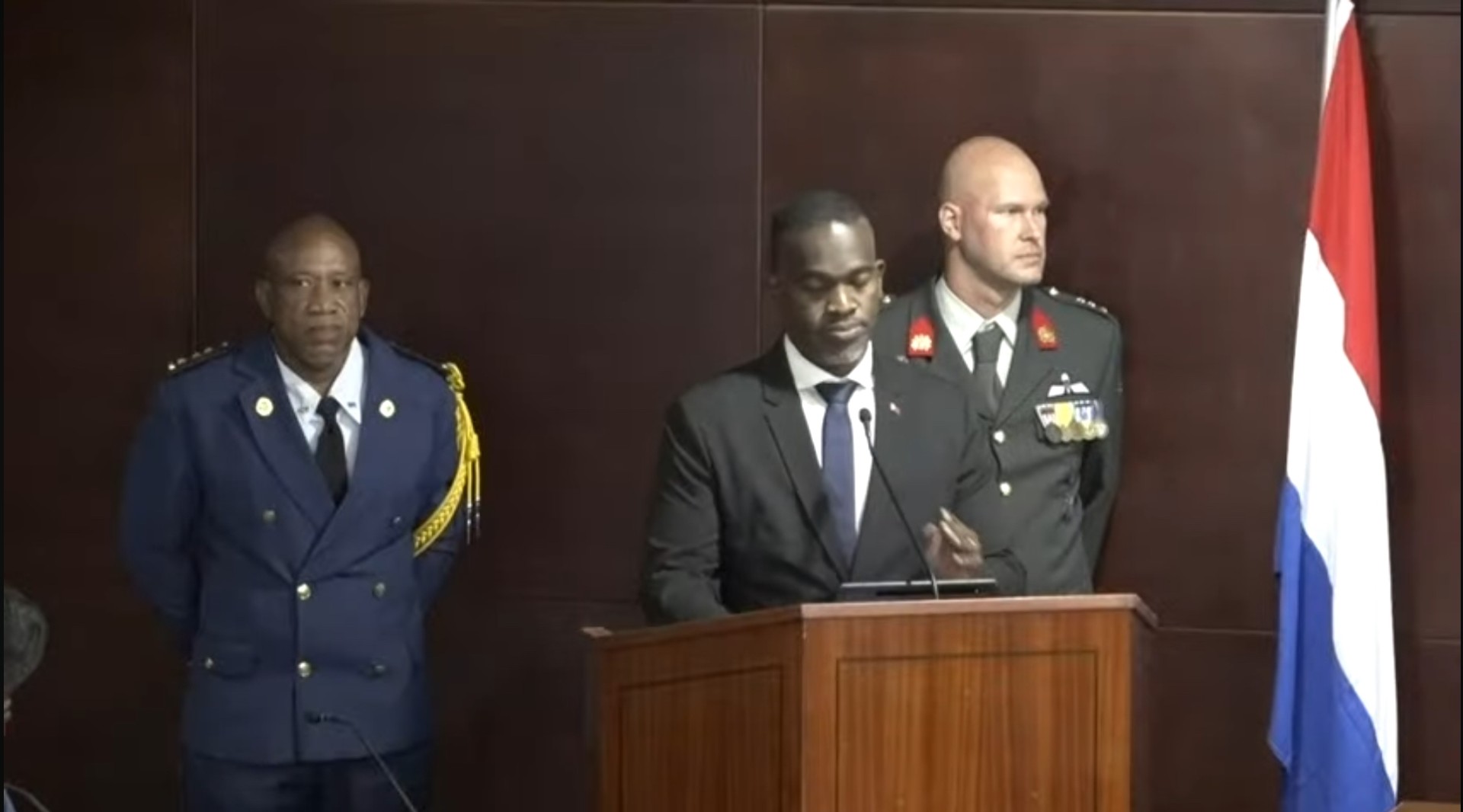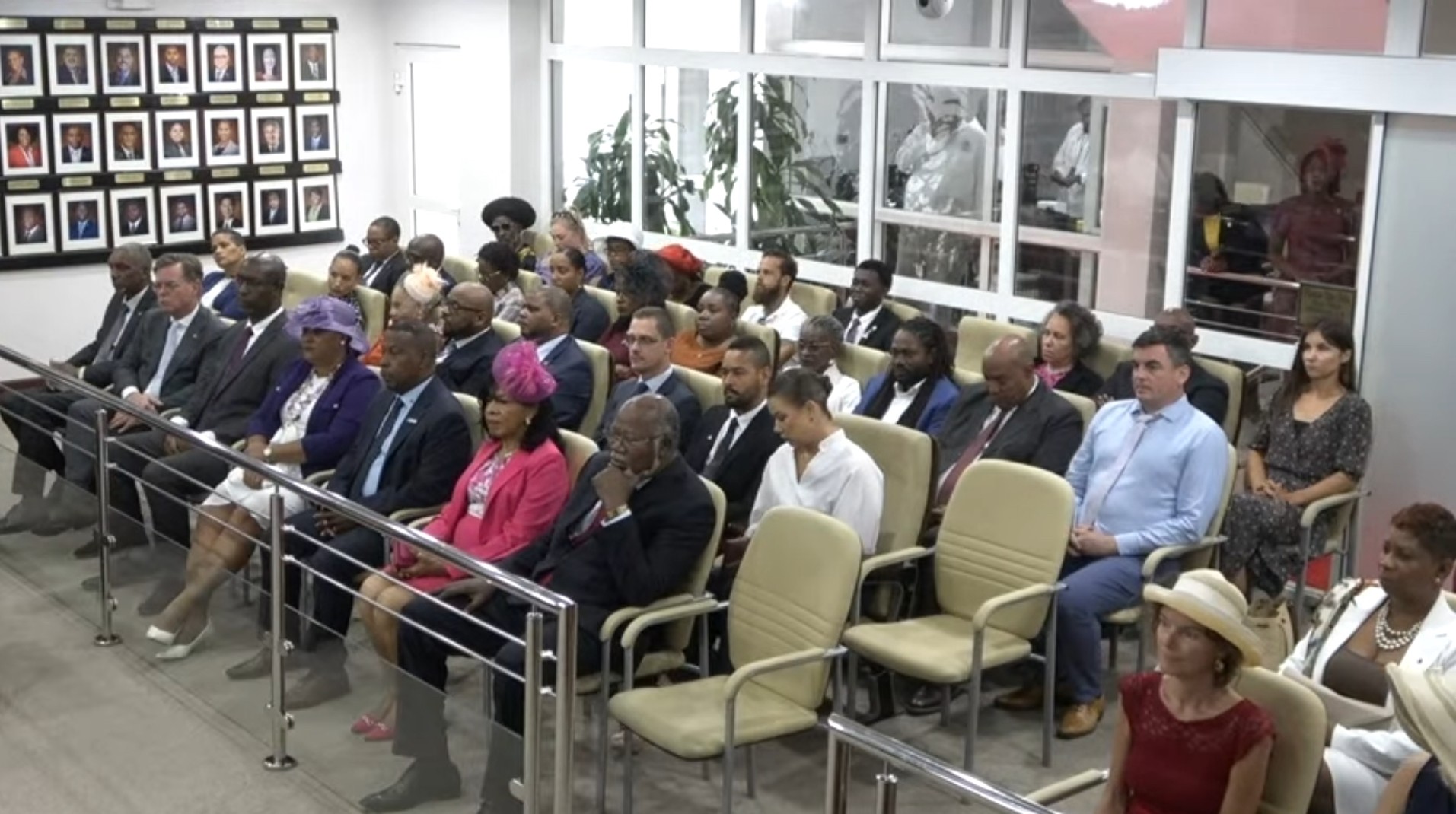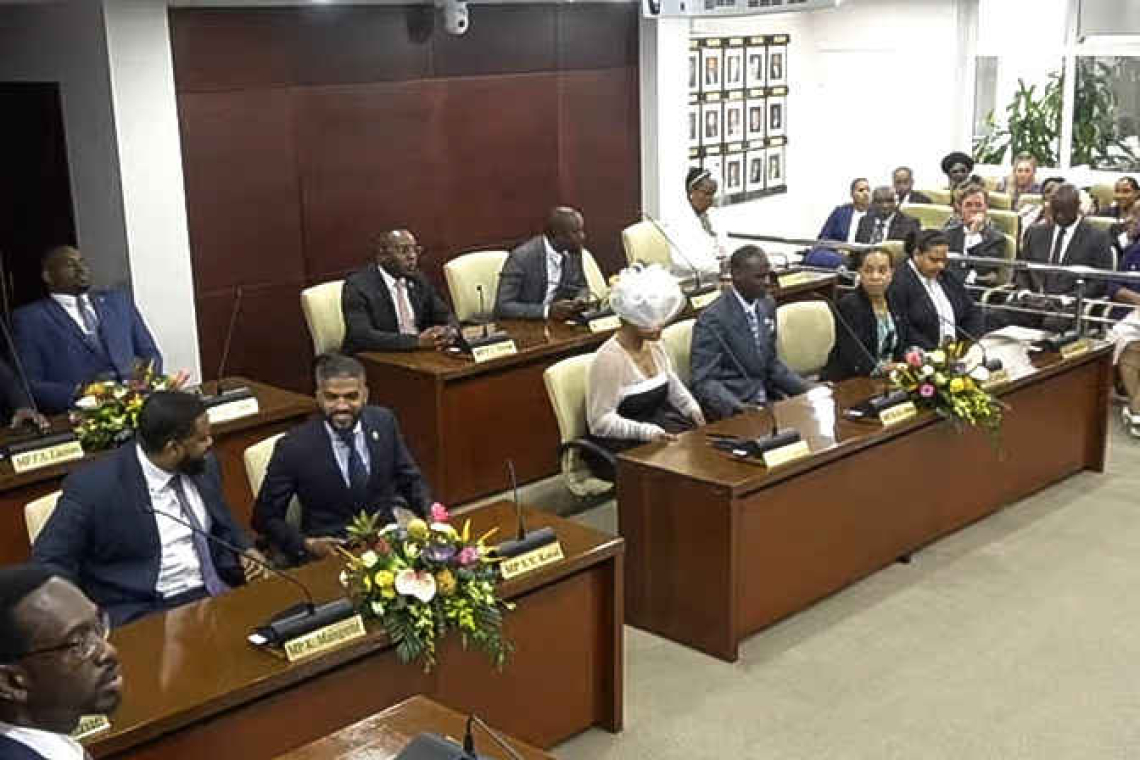Members of Parliament during the session.
~ Robust post pandemic recovery ~
PHILIPSBURG--The establishment of a sustainable solid waste management system; the restructuring and redesign of the tax system and stimulating the agricultural sector are amongst the list of the policies to be pursued by government in the new term (see related stories).

From left: President of the Collectivite of French St Martin Louis Mussington, VROMI Minister Patrice Gumbs, Prime Minister Dr. Luc Mercelina, Chairperson of Parliament Sarah Wescot-Williams, Governor Ajamu Baly and his wife after the official part of the ceremony on Tuesday.
 Governor Ajamu Baly delivering his address.
Governor Ajamu Baly delivering his address.
 The packed public tribune in the House of Parliament.
The packed public tribune in the House of Parliament.
Governor Ajamu Baly outlined the plans during his remarks at the opening ceremony of the 2024-2025 parliamentary year on Tuesday. The solemn opening ceremony was witnessed by Members of Parliament (MPs), ministers and a cross section of well-dressed dignitaries. Nation Opportunity Wealth (NOW) MP Christophe Emmanuel was absent with notice.
Baly opened his remarks by saying that St Maarten is at a critical turning point in its development, from the devastating hurricanes of 2017 to the COVID-19 pandemic and the current utility crisis. He said the country continues to contend with recovery efforts and sustainable development, which he said requires an environment that is enabling and one that is conducive with equity and equality for the greater good. However, achieving this, he stressed, requires a foundation built on good governance. “Currently government’s administration, whether in policy formation or operations, is compartmentalized or soloed, which limits the level of coordination and cooperation needed for strategic planning and decision-making. This should not be the case, especially as government struggles with the lack of capacity and resources as well as the ongoing developmental challenges.”
Robust recovery
As it relates to the country’s economy, Baly said St. Maarten has shown a robust post-pandemic recovery, driven by stay-over tourism and construction. The country’s gross domestic product (GDP) growth is forecasted at 4.3% for 2024, showcasing levels back to normalcy. This growth has been bolstered by accelerated reconstruction activities, supported by significant disbursements from the Trust Fund, new construction via private investments and by an increase in stay-over tourism.
According to the governor, inflation in St Maarten is projected to increase slightly, primarily influenced by global trends, particularly from the country’s main trade partner, the United States.
The unemployment rate, he said, is forecasted at 5.4% in 2024. This is down from 7.6% in 2021.
Stay-over arrivals are anticipated in 2024 to be 400,000, approximately a 10-15% increase of arrivals in comparison to 2023 and drawing us closer to St Maarten’s figures pre-Irma and Maria.
This year, the country expects 1.4 million cruise passengers. Cruise arrivals have taken a few years to recover and by extension increase in passenger arrivals, Baly said. “However, we do anticipate further growth this year and by extension in 2025 especially after the [Florida-Caribbean Cruise Association – Ed.] FCCA Conference that is planned to take place here in October 2024.”
Marketplace
He said efforts of getting the marketplace re-construction completed is also imperative for the industry alongside beautification and revitalisation of Philipsburg to ensure economic activity remains and passenger experience is enhanced to build loyalty.
“With the aim of improvement of the economic and investment climate, projects are about to start in particular to address the legislative concerns to ensure that doing business in St. Maarten can be made easier.”
He said also that legislative work is near completion and thus making it one step closer to the Gaming Authority which will assist with the required regulations for safe and responsible gaming while addressing social issues.
Agriculture
In the area of Agriculture, Livestock and Fisheries, the governor said government is working towards stimulating the sector in various ways such as through green overseas programme; train the trainer hydroponics in school and communities; establishing industry standards and requirements; working alongside neighbouring islands to ensure food security which includes the French side and islands such as Saba, St. Eustatius, St. Kitts and Nevis, Dominica and the Dominican Republic and securing education programmes and funding for business opportunities in the sector.
He said also that government is planning a review of the current structure and processes in regards to public transportation and defining a way forward for the industry noting the challenges, cost and taking into account innovative ways to enhance the experience of residents and visitors alike.
“Data gathering and research analysis is planned to update the existing National Energy Policy, given the various challenges and commitments, not only of the country, but also of our utility company for synergy and sustainability purposes,” stated Baly.
STA
Government, Baly noted, is also determined to establish the St. Maarten Tourism Authority (STA). Government is also committed, as monitoring economic trends and employment indicators allowing for adaptation of strategies and policies to ensure sustained economic growth and prosperity for St. Maarten.
He spoke about the National Development Vision of St. Maarten (NDV), which he said is a first step in the direction of strategic planning and long-term sustainable development. “The Baseline Study of St. Maarten’s development from a government perspective has revealed that St. Maarten is still transitioning in building government infrastructure and an enabling environment to operate autonomously as a country within the Kingdom of the Netherlands. The transition process essentially requires St. Maarten to build a whole government infrastructure (including the effective exercise of a new government system) from scratch whilst at the same time maintaining public services. Despite a great deal of local planning undertaken to effect the transition by 2012, momentum and efforts have faltered,” he said.
From 2010 to date St. Maarten has had several changes in government. Changes in the Executive Branch brings along a varying manner in the handling of the public administration. “This in particular as it pertains to top-down management of the ministries. As such, operational and strategic governance is in particular impacted, as every government tends to “govern” in a different manner. Albeit the case, this should not continue to negatively affect the functioning of government, as the framework of the public administration serves as the operational anchor for the public administration and good governance.”
He said it is imperative that the institutional design of St. Maarten be completed and fully enacted, anchored adequately to ensure not only continuity but moreover ensure strategic and operational governance. “Change in the Executive Branch should not equate to the complete and continuous disruption of the public administration, as processes, rules and regulations remain in place. “
To effectuate such, currently under development are a series of instruments and initiatives that will support a whole-of-government approach to high-level management. The objective of this approach is to streamline efforts and resources, anchor high-level management, enhance integration of efforts and establish a knowledge-based public service, he said.







